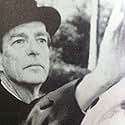IMDb-BEWERTUNG
7,1/10
695
IHRE BEWERTUNG
Füge eine Handlung in deiner Sprache hinzuAn eccentric elderly man tries to enjoy the three things in life that he considers real beauty: collecting art, collecting flowers, and watching pretty women undress.An eccentric elderly man tries to enjoy the three things in life that he considers real beauty: collecting art, collecting flowers, and watching pretty women undress.An eccentric elderly man tries to enjoy the three things in life that he considers real beauty: collecting art, collecting flowers, and watching pretty women undress.
- Auszeichnungen
- 3 Gewinne & 4 Nominierungen insgesamt
Sarah L. Walker
- Jane
- (as Sarah Walker)
Empfohlene Bewertungen
A middle-aged man is unable to have relationships with women, apparently a byproduct of his strict upbringing we learn via flashbacks. It is by turns provocative, funny, and pretentious, but always interesting and definitely quirky. Kaye is well cast as the man-child in search of beauty while Best is lovely as one of the objects of his affection. Among the amusing characters are the philosophical postman and Best's hack artist boyfriend. Cox directs with a sense of freshness, helped considerably by the ever-present music from Donizetti's "Lucia di Lammermoor." The flashback scenes of Kaye's childhood are tinged with Oedipal feelings, simultaneously sad and erotic.
I've seen many films by Paul Cox but only one or two continue to impress me after all these years - Man of Flowers (1983) is one of them. Taking on familiar Cox themes such as loneliness and sexual repression, Man of Flowers adds an eloquent European feel to its Australian setting. Although the story is not a conventional linear narrative, Cox combines distinctive visual tones (super-8 flashbacks/ conventional framing such as the striptease at the beginning)) to capture different aspects of the protagonist's reclusive life (played by Norman Kaye). What is unique about this film is its refusal to subscribe to any cinematic norm. Thus we get a philosophical postman who adds a touch of off-centered eccentricity to an already edgy patchwork of lesbianism, blackmail and oedipal longing. The only sad aspect of the film is its low-budget which has seriously impaired its standing as a classic. The sound is not the best on VHS although the operatic score (Donizetti's "Lucia di Lammermoor) more than compensates for this flaw. I presume the original budget of $250,000 was not spent enhancing the sound quality.
10Mully-3
A wonderful slow, gentle film, full of strange characters. I loved the eccentricities of all the characters; the mad painter, the crazy psychiatrist, the main character, Charles, who is obsessed by flowers. Even the postman who delivers the letters Charles sends to himself every day is delightful. The characters are surrounded by wonderful images and the background music is absolutely divine. The rather freudian storyline follows the relationships between Charles, a rich eccentric artist, a young woman he pays to strip for him and her violent boyfriend. I liked the strength of Charles's character despite his gentleness, which leads to a good twist at the end. I loved it.
In my language, there's a different word for erotic and non-erotic love. English has just one word for the two. And Charles, the main character in this story, doesn't even make a distinction. The attraction he feels to flowers or classical music is erotic, as is his attachment to his mother; at the same time, he's unable to consummate a sexual relationship. He's a profoundly lonely person, who writes letters to himself and buys 'human relationships' in the form of a doctor or a stripper to whom he hardly talks. Lisa, in turn, is just as lonely: her boyfriend hardly talks to her, only takes her money to spend on drugs. This film is about the isolation of modern people, the impossibility to create relationships. Charles sublimates this longing into a fondness for all art and beauty, others escape into drugs or pointless 'creation'. And the question arises: why am I watching this film? What am I substituting with it?
The film is remarkable in that it delves into the issue of sexual inversion - and how childhood events and parent relationships mark us for life. In the case of Charles, we see that his mother alternately enveloped him in her embrace and rejected him, and his father, a remote, humorless person, punished him for being a curious child. End result: he loves beauty deeply, but cannot consummate a relationship. The use of music, both the operatic excerpts and Charles's own playing of the church organ, was pointed and poignant. All actors turned in splendid performances. Norman Kaye was very believable in the title role, and Alyson Best as the young beauty who sees Charles for the decent, loving person he is does sound work. The rest of the ensemble is also to be commended for this picture of life and art's relationship to it.
Wusstest du schon
- WissenswertesOne of seven film collaborations of actress Julia Blake and writer-director Paul Cox. They are [in order]: 'Lonely Hearts' (1982), 'Man of Flowers' (1983), 'My First Wife' (1984), 'The Paper Boy' episode of 'Winners' (1985), 'Cactus' (1986), 'Innocence' (2000), and 'Human Touch' (2004). During the 1980s, Blake appeared in a Cox film every year for five straight consecutive years between 1982 and 1986.
- Zitate
Charles Bremer: I'm only half a man.
Lisa: It's the right half.
- VerbindungenFeatured in Reading Australian Film (1988)
Top-Auswahl
Melde dich zum Bewerten an und greife auf die Watchlist für personalisierte Empfehlungen zu.
Details
Box Office
- Weltweiter Bruttoertrag
- 273 $
Zu dieser Seite beitragen
Bearbeitung vorschlagen oder fehlenden Inhalt hinzufügen
























